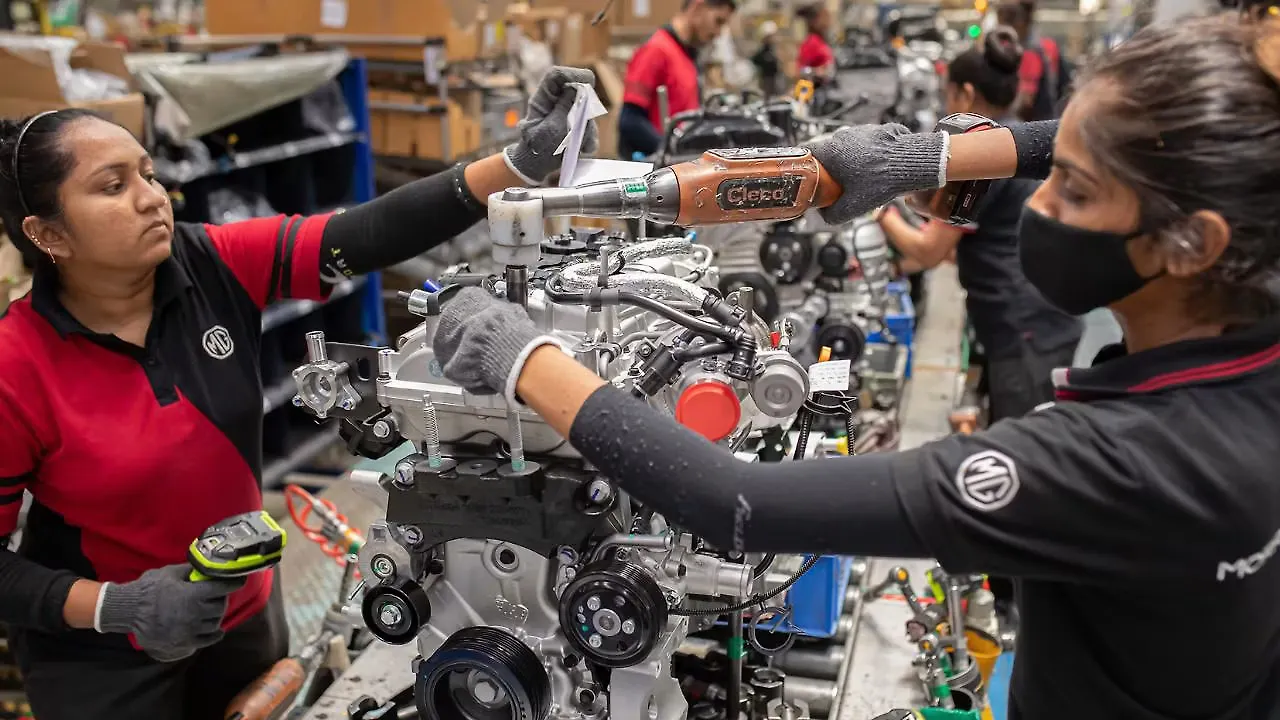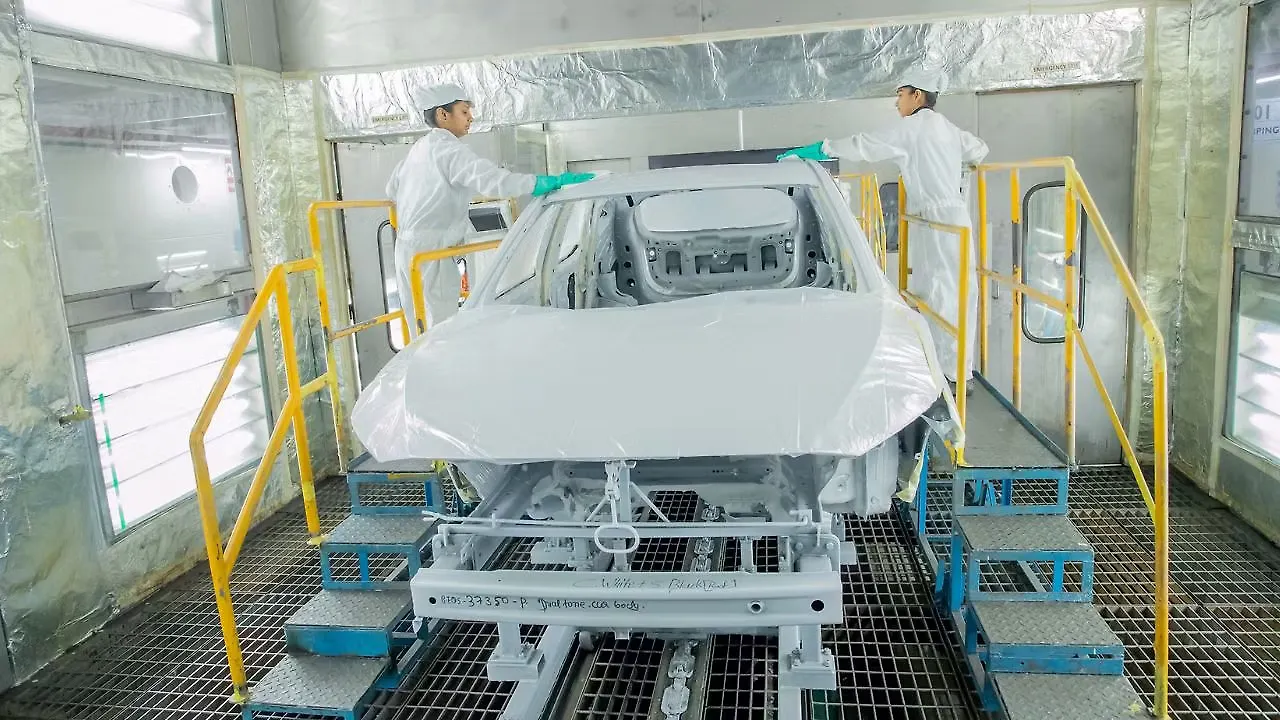
The British legacy automaker JSW MG Motor India has undergone a remarkable transformation over the past three years. By significantly increasing the number of women on the shop floor, the company has managed to maintain its production rate of JPH - jobs (number of cars) per hour, even as it has expanded the range of models and variants.
This strategic move has not only enhanced operational efficiency but also demonstrated a strong commitment to diversity and inclusion in the automotive industry.
Currently, the company produces over 120 variants across five models: Hector, ZS EV, Gloster, Astor, and Comet EV. The significant contributions of the women on the shop floor are evident in the company's ability to operate two assembly lines in the shopfloor that manufacture both conventional ICE vehicles and their electric counterparts.
Additionally, the company has seen an improvement in the 'first shot OK' rate, referring to vehicles that do not require any repairs or adjustments after leaving the assembly line. This enhancement has led to a productivity increase of up to 6% in terms of the number of vehicles produced per hour. Currently, about 34% of the company's total employees are women, with nearly 40% of the shop floor workforce being female, including 33% in lead roles. The automaker aims to achieve an equal gender ratio in the next few years.
Achieving this balance has not been easy. As a company that prides itself on being an 'autotech brand with a purpose,' it faced significant challenges in recruiting women for manufacturing roles.
When MG Motor began recruitment efforts after acquiring GM's plant in Halol, its business philosophy emphasised a well-defined social dimension focused on three key pillars: innovation, diversity, and community. The carmaker aimed to build a strong foundation for its future operations by promoting gender equity and community development alongside its innovative marketing programmes.
However, local villagers were initially hesitant due to various apprehensions. To address these concerns, the company invited many families to visit the plant, providing them with a sense of security and reassurance about their daughters pursuing careers in car assembly.

Manufacturing organisations like JSW MG require employees who have completed ITI courses in trades such as fitting, diesel mechanics, automotive, electrical work, and welding. However, women seldom enrol in these trades, limiting the pool of qualified female candidates. As a result, the company selects students who have completed grade 12 and provides them with extensive training and hands-on experience over an extended period.
Elaborating on the process, Yeshwinder Patial, Senior Director of HR at JSW MG Motor India, explained that the company prepares these young women through a step-by-step approach. This begins with two to three weeks of training at its training centre, followed by three weeks of tutoring in their respective departments, where they learn the necessary skills on the job from senior technicians. Once their mentors approve their performance, they are assigned to regular work. Male candidates from ITIs also undergo on-the-job training as their education is primarily theoretical.
In addition to technical skill building, the company provides extensive soft-skills training, particularly for associates who come from rural areas and are entering their first jobs. This training includes communication skills, personality development, basic hygiene, and other essential skills.
Given the manufacturing setup's demand for job rotation, individuals are trained on every machine in their department, enabling them to handle any machine. These multi-skill capabilities not only help break the monotony for the employees but also support the company in managing absenteeism.
Furthermore, the company has recently employed visually challenged individuals at its office in Gurugram, demonstrating its commitment to inclusivity and diversity.
According to Patial, women managers also require training to address unconscious biases like their male counterparts. The difference is that women often do not vocalise these biases.
Speaking on the unique initiatives taken on the shopfloor, Ravi Mittal, Director of Manufacturing, JSW MG Motor India, said adopting Industry 4.0 technologies has significantly improved operational efficiency and error-proofing. This is particularly crucial for the paint shop and utility processes, which require continuous parameters and equipment status monitoring.
For instance, the company has installed a 'Windshield Glass Primer Vision System' in the general assembly shop. This system uses overhead cameras to compare primer applications on windshields against a reference database, ensuring proper fitment and preventing critical failures.
In the transmission oil filling process, a vision system-based camera verifies oil specifications before initiating the filling cycle, preventing incorrect oil use and triggering fault alarms for discrepancies.
The integration of a Supervisory Control and Data Acquisition (SCADA) system in the paint shop and utility allows continuous monitoring of process parameters and equipment status from a centralised location, accessible via mobile devices.
The company has also advanced its IoT initiatives, starting with online monitoring of process fans and blowers in the paint shop. IoT-enabled sensors on all rotating equipment (fans, etc.) monitor critical parameters such as vibration, temperature, and noise, providing real-time and historical data for effective troubleshooting and maintenance.
The Energy Monitoring System centralises the utility units, gathering electrical, gas, and water data at a single point for comprehensive monitoring and analysis. This system has significantly optimised specific energy consumption across various shops, he mentioned.

Digital Twin
The automaker collaborated with Siemens to develop a Digital Twin application for the PTED (Pre-Treatment Electro Deposition) line, which includes 15 process stages and 14 simultaneously operating hangers. The PTED line had been a bottleneck for the plant and downstream processes due to its low JPH rate. Despite the numerous opportunities for improvement, they were not easily identifiable through visual inspection alone. Implementing the Digital Twin application allowed the company to accurately identify and address these inefficiencies, significantly increasing the line's JPH from 12 to 18. This project showcases how advanced digital solutions can drive substantial operational improvements, Mittal added.
Other Women-centric Initiatives
The company has Drive Her Back (DHB), an annual returneeship programme to support experienced and qualified women in re-entering the workforce after a career break. The initiative aims to help a select group of women enhance their skills and rebuild successful careers. Over the course of four seasons, the programme received more than 1,500 applications, resulting in the successful placement of over 60 women.
The company also introduced the 'Women Interactive Network for Development' (WIND), an initiative to create a supportive network for women to learn and exchange ideas. This platform organises various activities, including connect sessions with inspirational women leaders, interactions with the company's leadership, coffee table meetings, book reviews, and women-specific learning and development programmes.
Another noteworthy initiative is Womentorship, a programme designed by women for women to support and mentor women entrepreneurs.
To date, the carmaker has invested approximately INR 7,000 crore, employing over 6,000 people (both directly and indirectly) and producing over 100,000 cars annually sold in the domestic market. The company has established more than 400 touchpoints across 170 cities.
CO2 Neutral Initiatives
The company has set an ambitious target of achieving carbon neutrality by 2029. Using 2020 as the baseline year, when it recorded 0.75 tonne of CO2 per car, the company has already reduced this figure to 0.25 tonne per car this year through various initiatives. For example, last year, 49% of the plant's power requirements were met through green sources, which has increased to 60% this year.
Among other initiatives, the company has adopted the use of PPG paint, which is valued for its quality, durability, and ability to meet the demanding standards of the automotive industry despite being more expensive. Additionally, the plant, which operates two shifts six days a week, achieved zero water discharge three years ago.
Also Read:
Steering The Future: The Indomitable Spirit Of Women In Mobility Sector
JSW MG Motor & Tata Capital Join Hands To Boost Dealer Financing Solutions